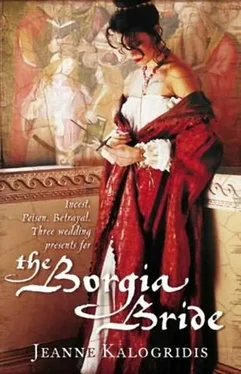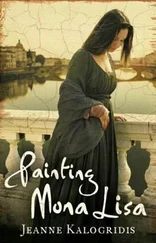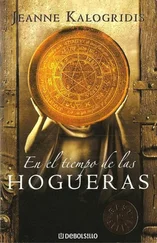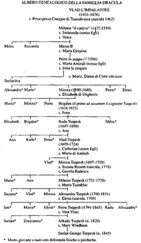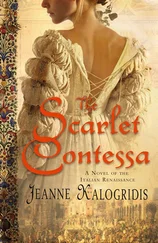As we stood near the entrance, a loud boom rattled the heavy doors and the very floor beneath our feet; all of us were startled, and the baby shrieked with abandon.
Alfonso and I looked at each other in alarm, remembering the horrors we had witnessed in Naples, and simultaneously whispered: ‘Cannon.’
For an instant, I entertained the wild notion that the French were attacking the city; but that was madness. We would have had warning; there would have been reports of their army marching.
Then, from deeper inside the building, we heard the frenzied shouts of men. I could not make out their words, but their hysteria was clear enough.
Lucrezia turned towards the sound; her eyes widened suddenly. ‘Father!’ she screamed, then picked up her skirts and ran.
I followed, as did Jofre and Alfonso, who first handed his child to the nurse. We ran up the stairs full tilt-the men quickly passing us, as they were unencumbered by long gowns.
On the corridor leading to the Borgia apartments, we were greeted by a dark haze that stung eyes and lungs; as I followed behind Alfonso and Jofre, I, too, stopped in horrified amazement at the archway that led into the Hall of the Faith, where His Holiness supposedly sat on his throne, expecting us.
The place where the throne had rested was now a great dust-clouded pile of wooden beams, shattered stone, and masonry: the ceiling above had collapsed, bringing down with it the carpeting and furniture housed on the floor above.
The carpeting and furniture I recognized, for I had seen them many a night in Cesare’s chamber. I felt a pang of wicked hope: if both Cesare and the Pope were dead, my fears for my family and Naples could be laid to rest with them.
‘Holy Father!’ ‘Your Holiness!’ The Pope’s two attendants, the chamberlain Gasparre and the Bishop of Cadua, cried out desperately for him as they bent over the rubble and tried to peer beneath it for signs of life. It had been their shouts we had heard-and now Lucrezia and Jofre added their voices as well.
‘Father! Father, speak to us! Are you injured?’
No sound came from the daunting heap. Alfonso went in search of help, and soon returned with half-a-dozen workmen bearing shovels. I held Lucrezia as she stared aghast at the pile, certain that her father was dead; I, too, was certain of the same, and struggled between guilt and elation.
It soon became clear that Cesare had not been in his apartment, for there was no sign of him. But no fewer than three floors had collapsed upon the pontiff. The amount of rubble was formidable; we stood for the space of an hour while the men worked vigorously under Alfonso’s direction.
At last, Jofre, who had been growing increasingly distraught, could no longer contain himself. ‘He is dead!’ he cried out. ‘There can be no hope! Father is dead!’
The chamberlain, Gasparre, also a man of emotion, took up the phrase as he wrung his hands in despair. ‘The Holy Father is dead! The Pope is dead!’
‘Quiet!’ Alfonso commanded, with a harshness I had never before seen in him. ‘Quiet, both of you, or you will plunge all of Rome into chaos!’
Indeed, beneath us we could hear the sound of footfall as the papal guards rushed to surround the entrance to the Vatican; we could also hear the voices of servants and cardinals as they echoed the cry.
‘The Pope is dead!’ ‘His Holiness is dead!’
‘Come,’ I coaxed Jofre, luring him away from the rubble to my side. ‘Jofre, Lucrezia, you must be strong now and not add to each other’s anguish.’
‘That is true,’ Jofre said, with a feeble attempt at courage; he took his sister’s hand. ‘We must trust in God and the workers now.’
The three of us linked arms and forced ourselves to wait calmly for the outcome, despite the frenzied sounds on the floor beneath us.
From time to time, the men would cease their digging, and call out to the Pope: no response ever came. He had certainly expired, I assured myself. In my own mind, I was already back in Squillace.
After an hour, they managed to work through the masonry deeply enough to discover an edge of Alexander’s golden mantle.
‘Holy Father! Your Holiness!’
Still no sound.
But God was merely playing a trick on us all. In the end, after they pulled away timbers and gilded tapestries, they discovered Alexander-covered in dust, terrified into muteness, sitting staff-straight upon his throne, his huge hands tightly gripping the carved armrests.
The cuts and bruises were so small, we could not even see them then.
Gasparre led him to his bed while Lucrezia summoned the doctor. Alexander was bled and developed a slight fever; he would see no one save his daughter and Cesare.
An investigation commenced. It was at first speculated that a rebellious noble had launched a cannonball-but in fact, a lightning strike, combined with a fierce gale, brought the roof down. It was mere chance that Cesare had left his chambers only moments before.
This was a divine warning, many whispered, that the Borgias should repent of their sins, lest God bring about their downfall. Savonarola had spoken from beyond the grave.
But for Cesare, it was a warning that he should commence sinning with a vengeance, to secure his place in history while his father still breathed.
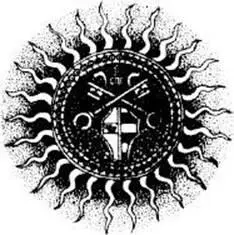
***
Given his strong constitution, Alexander recovered quite swiftly. The thunderbolt from God gave His Holiness a sense of mortality and a renewed appreciation of life; he began to spend less time with Cesare contemplating strategies for conquest and more time in the company of his family-which consisted of the swiftly-growing baby Rodrigo, Lucrezia, Alfonso, Jofre, and me. Once more, we supped nightly at the Pope’s table, where he discussed domestic matters instead of politics. A chasm was growing between Cesare and Alexander in terms of loyalty; I only hoped that the Pope was powerful enough to emerge the victor.
My private apocalypse began on the fifteenth day of July, barely two weeks after the ominous collapse of the ceiling upon the papal throne. We dined that night with His Holiness, and Lucrezia and I struck up a comfortable conversation with her father, one that we were reluctant to abandon when Alfonso stood up and announced:
‘With your leave, Your Holiness, I am tired this evening and wish to retire early.’
‘Of course, of course.’ Caught up in the discussion, Alexander dismissed him cursorily but civilly, with a wave of his hand. ‘May God grant you a good night’s rest.’
‘Thank you.’ Alfonso bowed, kissed Lucrezia’s hand and mine, then was off. I do not remember what we were chatting about, but I remember looking up at him, and being touched by the weariness in his face. Rome and its wicked intrigues had aged him; the sight prompted a distant memory: I was a mischievous eleven-year-old in Ferrante’s palace, taunting my little brother about our grandfather’s museum of the dead.
How can you stand it, Alfonso? Don’t you want to know if it is true?
No. Because it might be .
There were many things I wished I had never discovered; many things I wished I had been able to protect my brother from in Rome, allowing him to live in ignorant bliss. But such had been impossible.
I felt an odd desire to leave my conversation with Lucrezia at that moment and see Alfonso home-but to do so would have been rude. In retrospect, I cannot help but wonder how our lives would have changed had I accompanied him. Instead, I smiled up at him as he planted a kiss upon my hand; when he was gone, I dismissed all previous thoughts as useless worry.
Читать дальше
Конец ознакомительного отрывка
Купить книгу
